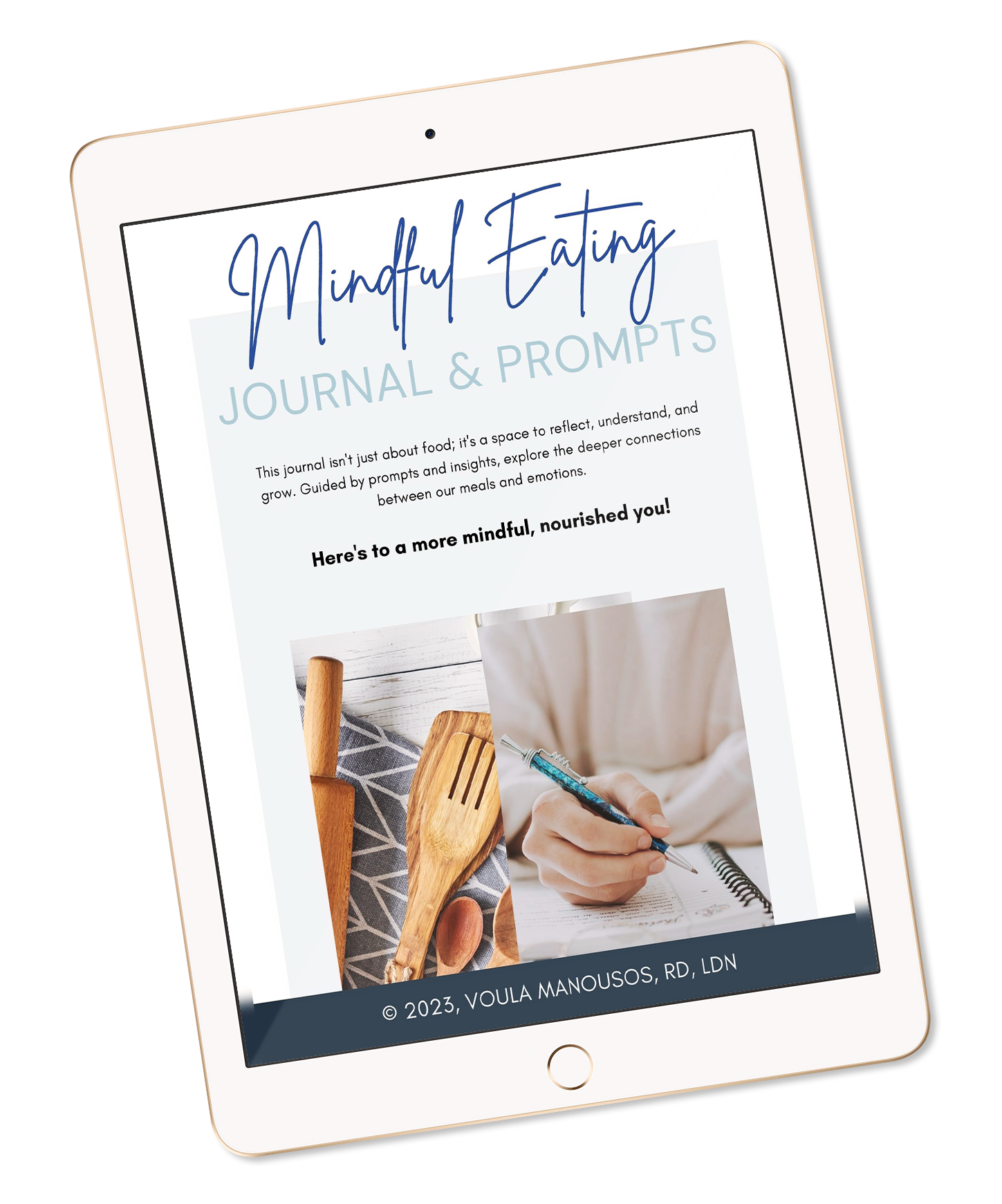Alcohol and Weight Gain: 5 Ways to Curb the Allure of Holiday Drinking
The holiday season is just around the corner with Halloween kicking off the festivities and New Year’s Day wrapping up the holiday season. That is three months of fun, holiday parties, lots of your favorite food, candy, and of course alcohol. Oftentimes we don’t think about the number of drinks we are consuming at a dinner party or gathering until we’ve had too much. At that point our minds might wander from the enticement of alcohol to the inevitable weight gain and work we need to put in for weight loss.
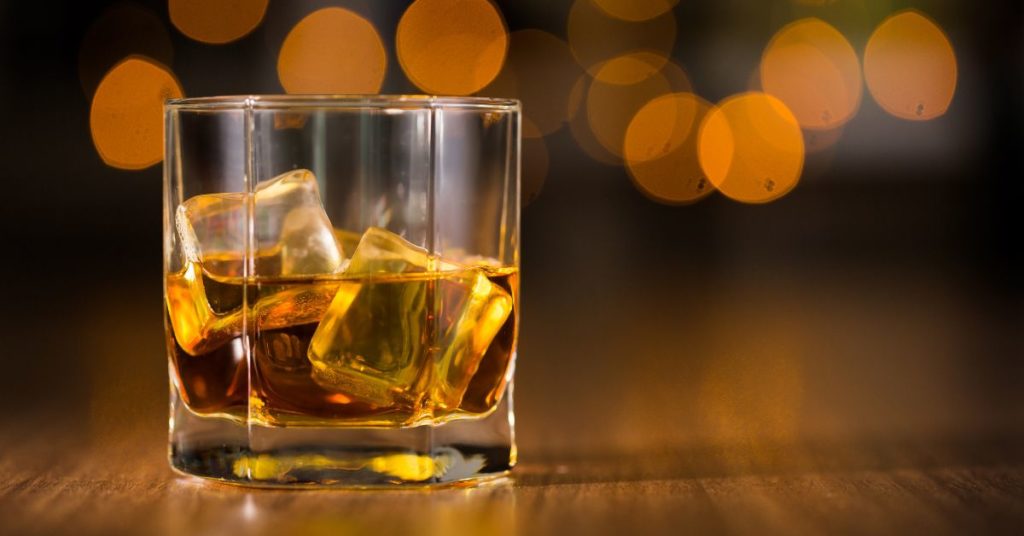
Here’s how a typical holiday season might look:
We typically will stop and pause at the buffet table and contemplate the dessert. We do this because we don’t want to over consume or unnecessarily gain weight from too much of the good stuff, but we typically don’t consider alcohol.
Depending on the type of drink and how many we are consuming we can “rack up” a substantial bill with regards to calories and eventual holiday weight gain without even knowing it.
Let’s take a look at how holiday drinking can lead to unnecessary weight gain and five things to do instead.
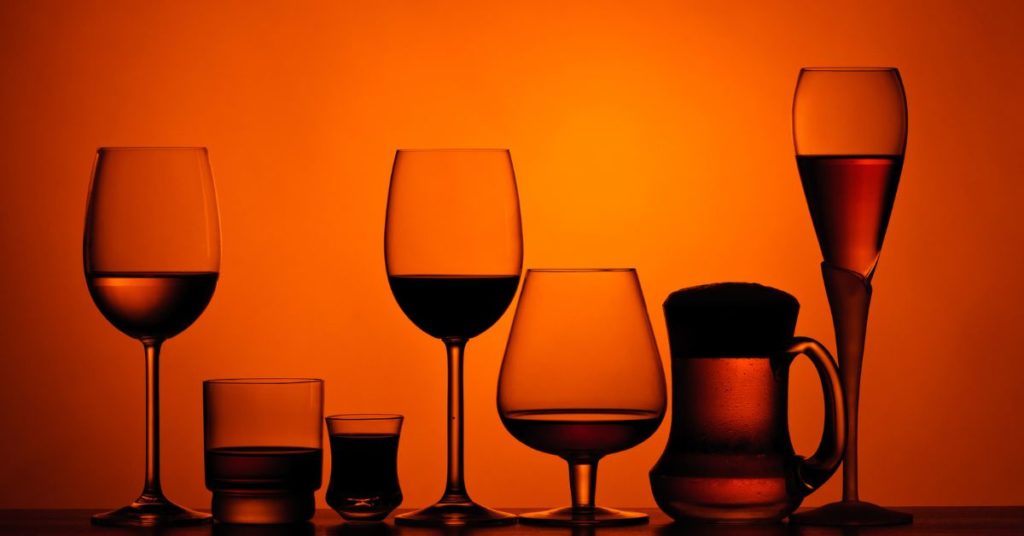
Alcohol and Its Effects on Weight Gain
Here are some things to keep in mind when trying to avoid the typical annual weight gain from drinking during the holidays:
1. Alcohol dishes up “empty calories”
Alcoholic drinks contain “empty calories” which means they provide the body with lots of extra calories and very few nutrients.
When looking at some frequently consumed alcoholic beverages, a 12-ounce beer offers up 155 calories and a 5-ounce glass of red wine 125 calories. If we compare an afternoon snack – which is typically around 150-200 calories – to an evening out drinking, you can easily rack up twice the amount or a meal’s worth of additional calories without even realizing it.
Even worse, drinks that contain mixers like fruit juices or sodas continue to add to the caloric toll.
2. Alcohol as the primary source of fuel
Other than calorie content, there are other reasons that excessive alcohol intake can lead to weight gain. When alcohol is consumed, it’s burned as your first source of energy. That means the glucose from carbohydrates and the lipids from fats take a back seat to being burned as fuel for the body.
As a result, these nutrients can easily end up being stored as fat.
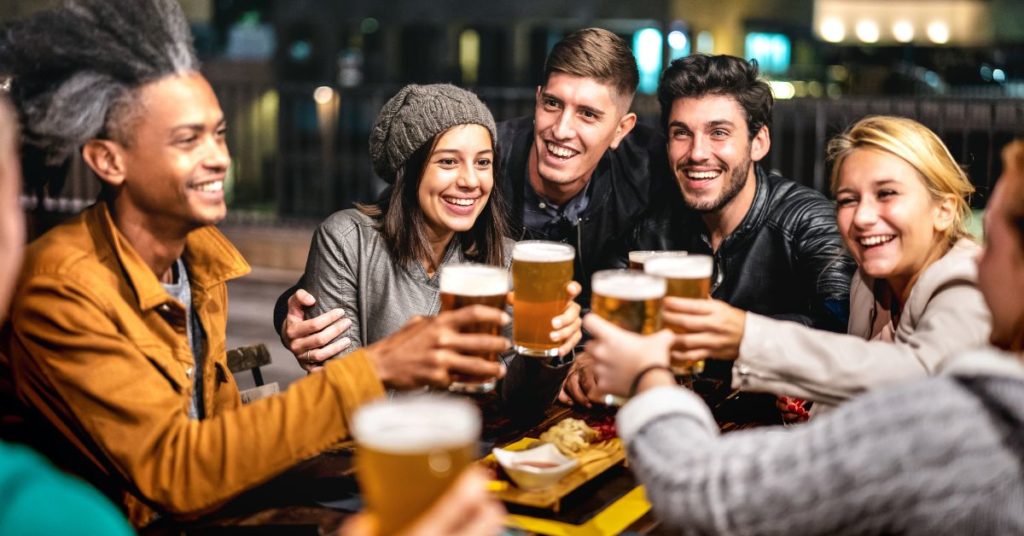
3. Alcohol can affect your liver
The liver’s primary role in the body is to “filter” any foreign substances that enter the body, like drugs or alcohol. The liver also plays a role in the metabolism of fats, carbohydrates, and proteins.
Drinking excessively can lead to alcoholic fatty liver. This condition damages the liver and affects the way the body breaks down and stores carbohydrates and fats.
Changes in the way the body stores energy from food can make it difficult to lose weight.
4. Alcohol can contribute to excess belly fat
People often refer to their “beer belly”. This is definitely real and is a result of over consuming your favorite holiday foods that are usually higher in simple sugars, like candy and cakes. Then we add soda, wine, mixed drinks, and even beer. These extra calories are typically stored in the body as fat.
We don’t choose where the extra weight ends up, but the body tends to accumulate fat in the abdominal area.
5. Alcohol can affect your judgment, especially with food
It is often hard to resist the “munchies” when drinking alcohol at a gathering or party. Alcohol lowers inhibitions that can lead to poor decision-making, especially when it comes to festive foods and holiday meals.
Recent studies found that mice given ethanol over a period of three days demonstrated a significant increase in the amount of food they ate. This study suggests that alcohol can increase the urge to eat more food because of the hunger signals triggered in the brain.
6. Alcohol can negatively affect sleep
You may feel a few drinks before bed may calm and relax you, but you may want to reconsider.
Research suggests that alcohol can disrupt sleep cycles. Sleep deprivation from lack of sleep or impaired sleep can lead to an imbalance in the hormones related to hunger, satiety, and energy storage.
Lack of sleep can lead to sugar and fat cravings, which can probably explain the cravings for that tall mochaccino latte with extra caramel to boost your energy level in the morning after a poor night’s sleep.
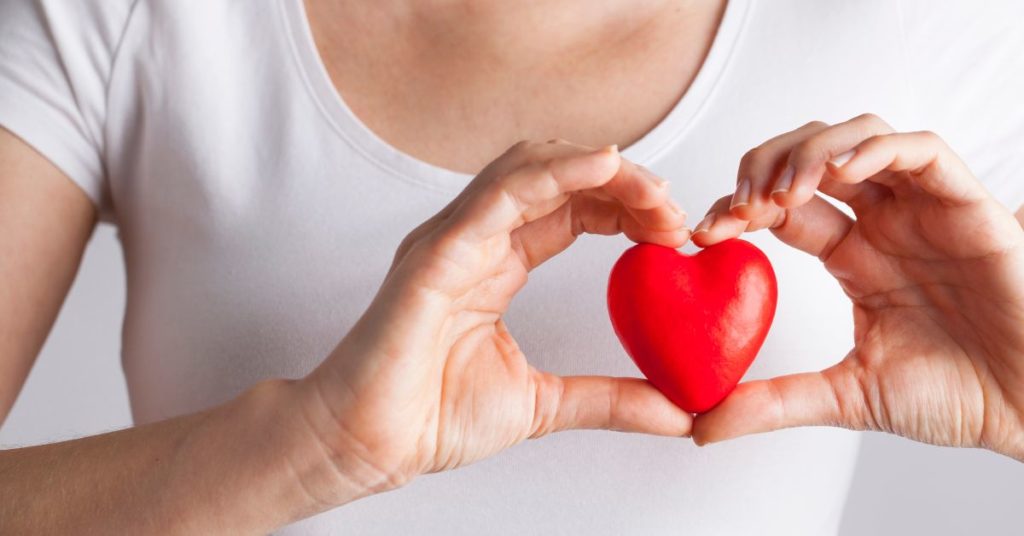
How Drinking Alcohol Affects Heart Health
If you enjoy that beer after a long day or enjoy sipping on a glass of wine or cocktail, keep moderation in mind to protect your heart health.
Moderate alcohol consumption means an average of one drink per day for women and one to two drinks for men.
Drinking excessively can increase your risk for many health issues including stroke, high blood pressure, heart failure, obesity, depression and alcoholism.
According to the AHA (American Heart Association), moderation is key.
Here’s what science tells us about alcohol’s effects on the body. Excessive drinking can raise your triglyceride level (a fat found in the blood).
The combination of a high triglyceride level combined with elevated LDL (bad) cholesterol levels or decreased HDL (good) cholesterol levels has been linked with fatty buildup in the artery walls. This increases your risk of atherosclerosis, heart attacks, and stroke. Not to mention the additional calories and the health risks that come along with them, like obesity and diabetes.
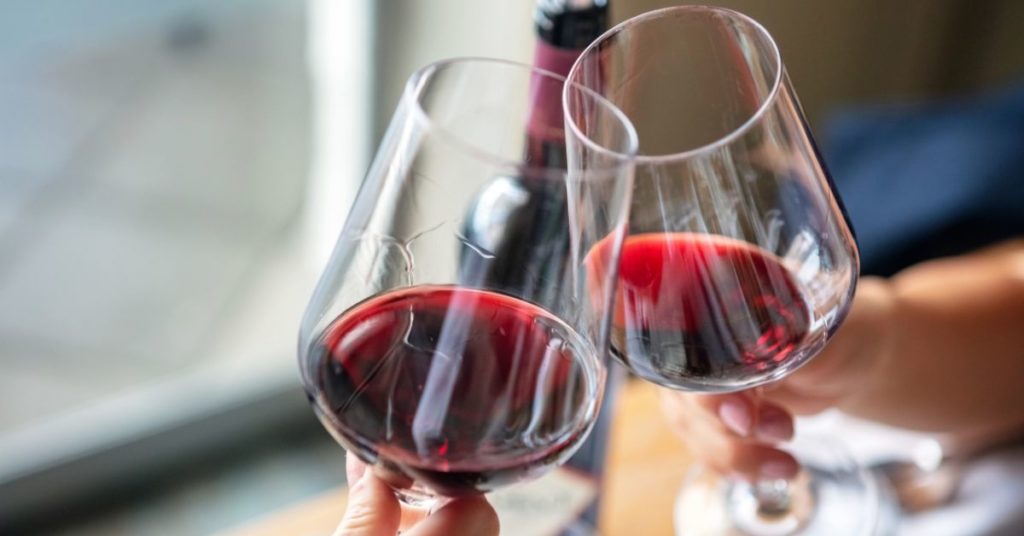
But what about red wine?
Isn’t red wine supposed to be healthy? That’s a popular theory. However, there has been no definitive answer if red wine is good for the heart (although some research has suggested it).
The antioxidants and flavonoids in red wine can potentially reduce heart disease risk, but these components can also be found in other foods like grapes and blueberries. So do we really need to drink red wine to bolster our heart health? Probably not.
It’s unclear whether red wine is directly associated with the health benefits seen in some studies, or whether other factors are at play. Perhaps people who sip red wine have higher incomes, and they are therefore more likely to have a healthier diet and lifestyle that includes regular exercise and heart healthy foods.
The American Heart Association does not recommend drinking wine or any other type of alcohol to gain potential health benefits. Instead, take steps to lower cholesterol, control high blood pressure, manage weight, get enough physical activity, and follow a heart healthy diet.

Excessive Alcohol Drinking and Weight Gain During the Holidays
The holidays are typically a time for festive gatherings at work and with family. This usually involves a few cocktails. People typically take the opportunity to loosen up at these functions and may not realize just how easy it is to over consume alcohol.
The average American gains 50% of their yearly weight gain during the holidays. While larger portion sizes, the types of food we are eating, and stress levels may have a factor, alcohol consumption is often overlooked because we assume that everyone will be drinking.
“This creates the expectation that everyone will be drinking and that it is socially acceptable, or even expected, to do so,” said George F. Koob, PhD, director of the National Institute on Alcohol Abuse and Alcoholism.
“Social pressure mixed with a brain chemistry deficiency provides a perfect storm for binge drinking,” added Shoshana Bennett, PhD, a psychologist from California.
Research has indicated that having low levels of dopamine may put people at risk for excessive drinking.
This is definitely a recipe for disaster especially when it comes down to not only your overall health, but also your weight maintenance or weight loss goals.
Being fully conscious and aware that you will be in an environment with plenty of food and alcoholic beverages is the first step. Making a plan to know how you will approach the gathering is the next step.

5 Ways To Curb Excessive Alcohol Consumption Leading to Weight Gain During the Holidays
Here are 5 easy tips to help you drink less during those holiday parties while still enjoying your time with friends and family. Come January, you can focus on bigger goals than weight loss!
1. Set a limit on the number of drinks
Make a decision on how many drinks you plan on having at a party or how many drinks per day you’ll have and try sticking to it.
2. Use a smaller glass and sip slowly
Portion control is important for achieving and maintaining a moderate weight, and that also holds for alcoholic beverages. Try focusing on the reason you are at the party, like connecting with others, and try sipping your drink slowly while enjoying the company.
3. Alternate alcoholic beverages with non-alcoholic beverages
Try some low calorie or calorie-free drinks like water, seltzer water, or diluted juice and seltzer. This will allow you to consume less alcohol in a set period of time.
4. Consider using an opaque glass or tumbler for your drink (alcoholic or not)
If you feel peer pressure to drink may affect your decision on how much to drink at a holiday party or gathering, using an opaque glass might help you receive less comments on what you are drinking.
5. Opt for wine or low-alcohol beers
Heavy beers, cocktails, and mixed drinks tend to be higher in calories.
Remember to stick with your plan! This might be difficult in the beginning, but as you become more aware of how much you tend to drink at a party and the negative effects it can have on your health and your waistline, it can be motivating to go into the party with a plan.
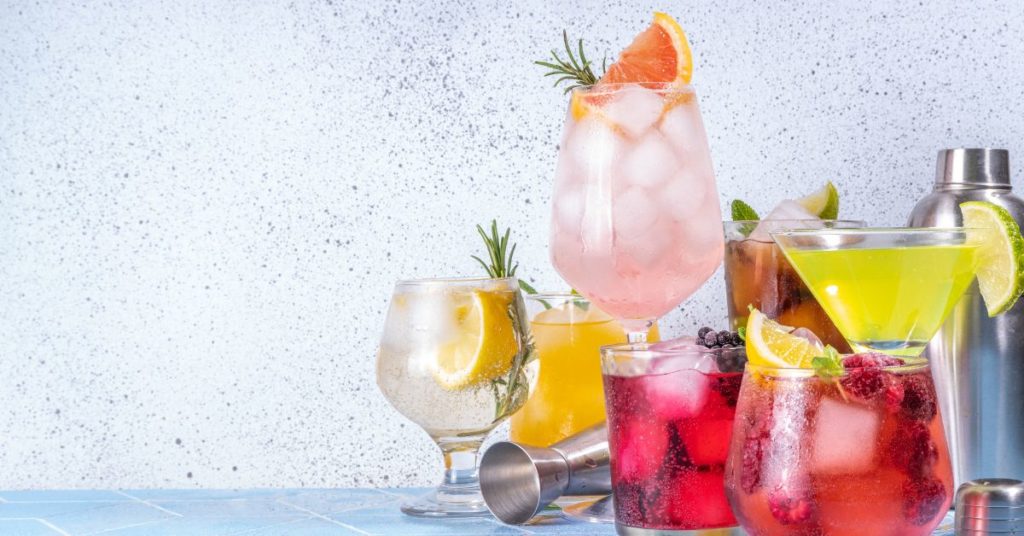
Bonus: Consider mocktails instead of alcohol
If you are trying to generally cut back on drinking because of health, weight, and sobriety issues, try a few mocktails instead of alcohol. Talk to the host ahead of time, so they have the ingredients on hand to create these drinks that you can enjoy during your holiday gathering.
Here are three that are sure to delight!
Three Easy Mocktails to Replace Alcohol (And the Nasty Weight Gain That Comes With It!)
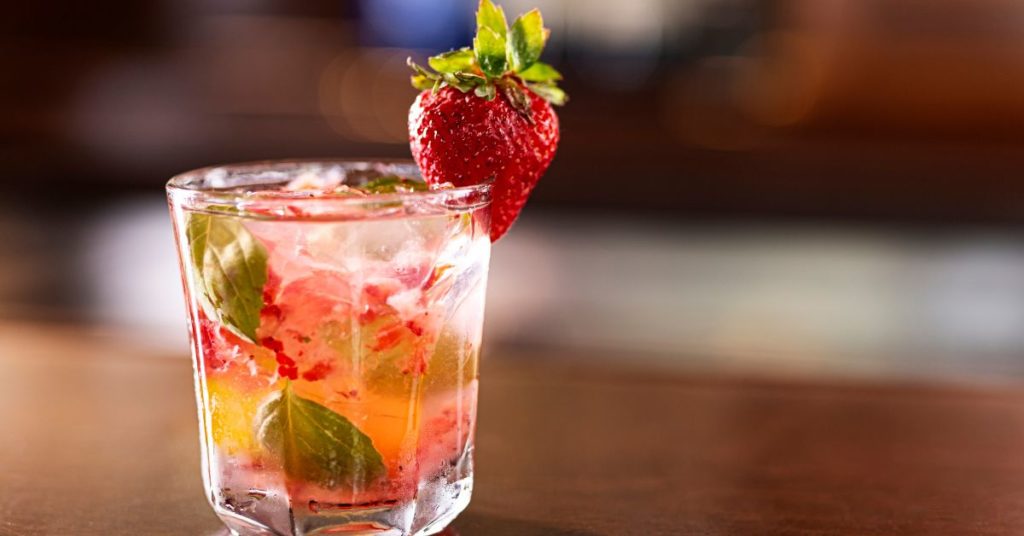
Strawberry Basil Smash Mocktail
From Cook At Home Mom
Ingredients
- 1.5 cups fresh strawberries
- 4-5 fresh basil leaves
- 12 ounces seltzer (1 can)
- 1 lime half juiced, half slices
Instructions
-
Wash, hull, and roughly chop the strawberries. Cut a lime in half. Juice half of the lime, and slice the other half of the lime for garnishes.
-
Muddle the strawberries, lime juice, and basil together using a large mortar and pestle. Alternately, you can use a fork or potato masher. It should be broken down enough so the mixture can fit through a straw, but not too much that there’s no texture.
-
Divide the berry mixture between two tall glasses. Fill the glasses with crushed ice, and fill to the top with seltzer.
-
Garnish with a slice of lime and more fresh basil (both optional).
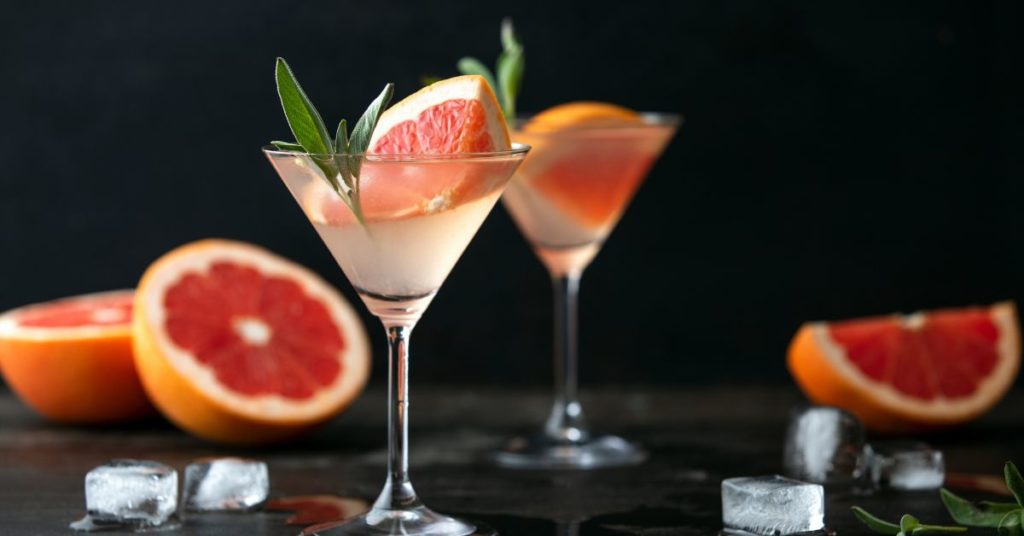
Fresh Grapefruit Sage Mocktail
From Cook at Home Mom
Ingredients
- 2 grapefruits, juiced, about 1.5 cups fresh juice
- 4-5 sage leaves
- 12 oz. unflavored or grapefruit flavored seltzer
- 1 cup crushed ice
- 3 Tablespoons lemon zest salt, optional
Instructions
- Optional: Salt Rim the glasses: Cut the a grapefruit in half and run one piece along the edge of four small glasses. Pour sea salt in a shallow dish and dip each glass in.
- Juice two grapefruits, removing any seeds. Bring the juice to a simmer in a small pan.
- Add 4-5 sage leaves and simmer everything together for about 5 minutes (or until reduced by about a third).
- Remove the leaves and chill the juice in the refrigerator until cold.
- Divide the juice between 4 glasses. Add crushed ice to each glass until 3/4 full.
- Top off with Grapefruit flavorful seltzer for a little sparkle!
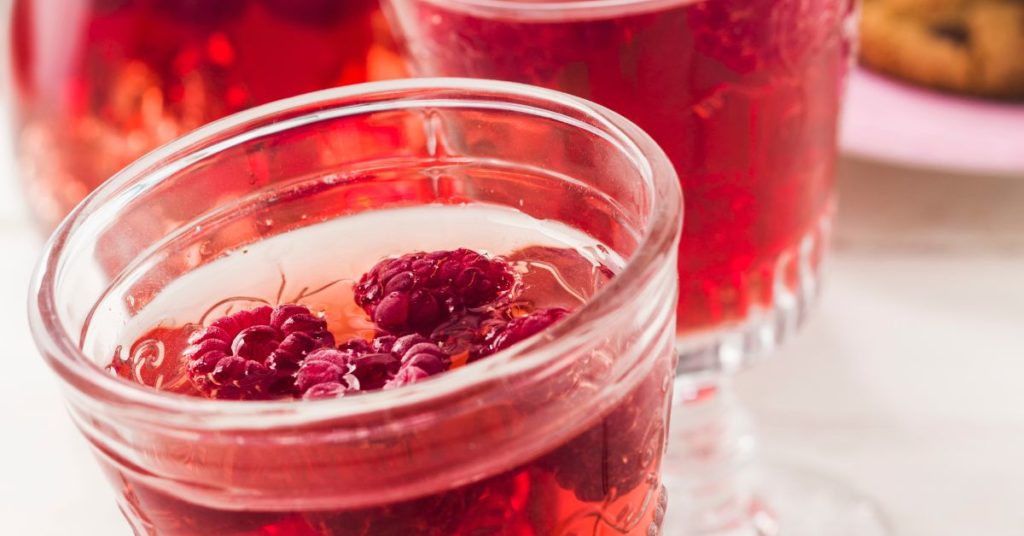
Raspberry Bee’s Knees
From barmini by José Andrés, Washington, D.C.
Found on Town&Country
Ingredients
- 1 oz filtered water
- .5 oz lemon
- .5 oz honey
- 2 raspberries + 1 raspberry for garnish
Instructions
- Shake ingredients with ice and strain into a glass with two raspberries. Top with soda water. Garnish with one raspberry.
Final Thoughts on Alcohol and Weight Gain During the Holidays
Alcohol is typically not a consideration when trying to manage weight, especially during the holiday period. The amount of calories in food and the type of food and physical activity are typically the two things that come to mind. Drinking during gatherings and holiday parties can become excessive because the expectation is to unwind with multiple alcoholic beverages.
While cutting alcohol completely out of your diet isn’t necessarily the only way to manage your weight, there are many health benefits that can be attained in your journey to a healthy weight by simply cutting back on the booze.
Healthy living doesn’t have to be boring. Having a plan on how much you will drink before going to the party, alternating between alcoholic beverages, mocktails and water can also be a good alternative.
Remember why you are attending the party and try to connect with people over conversation, music, and games. By doing so, you can enjoy a healthier body, improved sleep, better digestion, and fewer of those “empty calories” while staying on track with your weight goals.





